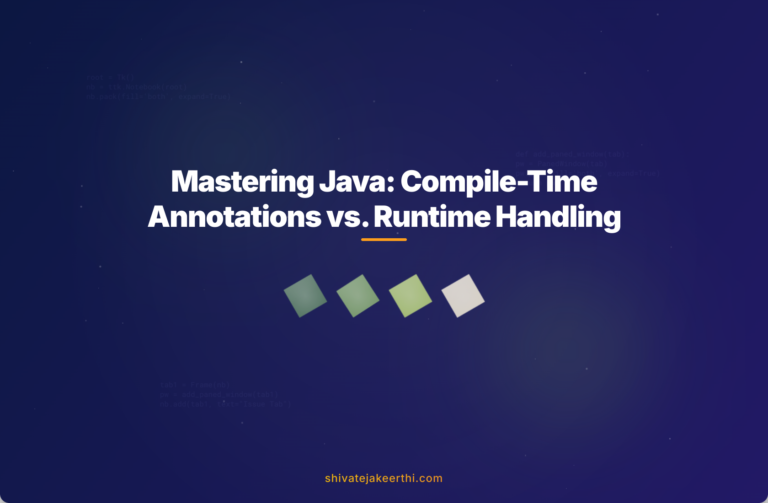When working with Annotation Processors in Java, developers sometimes run into a tricky scenario—your annotation processors compile beautifully, code gets generated, everything looks perfect during build time, but suddenly, at runtime, your custom annotations seem to vanish. You notice your AnnotationProcessor isn’t triggering as expected, despite meticulously registering it in the META-INF folder.
This quirk can leave you scratching your head. After all, you’ve followed the standard tutorials and official documentation closely. What could you possibly be missing?
Annotation Processors are powerful tools in Java for generating and modifying source code dynamically when custom Java annotations are discovered. They improve developer productivity significantly by reducing boilerplate code and enforcing coding standards.
But here’s an essential fact—AnnotationProcessors do their magic during compile-time, not runtime. Understanding this subtle difference will help clarify the foundation of your issue.
Let’s step back briefly. An AnnotationProcessor takes custom annotations defined by you and generates additional Java code or resources. Developers frequently use this feature in frameworks like Dagger, Lombok, or MapStruct, greatly simplifying repetitive coding tasks.
I recently created a straightforward custom annotation named TestAnnotation.java. The intention was clear—use an annotation like @TestAnnotation on certain classes to automatically generate some logging or additional behavior. To verify functionality, a simple AnnotationProcessor named TestAnnotationProcessor.java processes the annotation and generates supplementary Java source files.
Initially, tests seemed positive. During the Maven build using maven-compiler-plugin and maven-jar-plugin, the source files generated as expected indicating a correct setup. However, once I ran my packaged JAR file at runtime, the annotation processing logic didn’t execute—not a single println statement or evidence of the annotation processor’s code was present.
Frustrating, right?
Naturally, I began researching and testing numerous configurations online. Forums and Stack Overflow posts revealed common recommendations:
- Ensure Annotation Processor registration file is correctly placed in META-INF/services/ directory within the JAR.
- Double-check plugin execution using `annotationProcessorPaths` in Maven’s compiler plugin settings.
- Consider dependency scopes and configurations affecting annotation processors.
Despite meticulously checking every setting, my runtime scenario remained disappointing. Eventually, the crucial realization crystallized—AnnotationProcessors don’t run at runtime. This clarifies why my processor logic wasn’t triggering during application execution.
Let’s briefly explore the setup to clearly understand this situation:
Maven Configuration Details
My project’s POM included standard settings to compile Java code with annotation processors:
<plugin>
<groupId>org.apache.maven.plugins</groupId>
<artifactId>maven-compiler-plugin</artifactId>
<version>3.11.0</version>
<configuration>
<annotationProcessorPaths>
<path>
<groupId>com.google.auto.service</groupId>
<artifactId>auto-service</artifactId>
<version>1.1.1</version>
</path>
</annotationProcessorPaths>
</configuration>
</plugin>
Code Examples
Let’s clarify through some relevant examples. Here’s our sample Annotation class:
TestAnnotation.java:
@Retention(RetentionPolicy.RUNTIME)
@Target(ElementType.TYPE)
public @interface TestAnnotation {
String value() default "";
}
Next, a test class utilizing the annotation (TestClass.java):
@TestAnnotation("demo annotation")
public class TestClass {
// Sample class logic
}
The processor (TestAnnotationProcessor.java):
@SupportedAnnotationTypes("com.example.TestAnnotation")
@AutoService(Processor.class)
public class TestAnnotationProcessor extends AbstractProcessor {
@Override
public boolean process(Set<? extends TypeElement> annotations, RoundEnvironment roundEnv) {
System.out.println("Running Annotation Processor...");
return true;
}
}
Finally, your main entry point (TestAnnotations.java):
public class TestAnnotations {
public static void main(String[] args) {
TestClass test = new TestClass();
System.out.println("Main method executed.");
}
}
Inspecting META-INF
Checking the embedded META-INF/services in the JAR file confirmed correct processor registration:
META-INF/services/javax.annotation.processing.Processor
com.example.TestAnnotationProcessor
All appeared correctly configured from my packaging viewpoint.
Understanding Runtime vs. Compile-time AnnotationProcessing
After investigating deeper, the truth emerged clearly. The critical point:
- Annotation Processor APIs (javax.annotation.processing.Processor) run at compile time only.
- They aren’t available and cannot execute during runtime environments. If your processor logic involves generating sources or verifying configurations, this occurs only at compilation.
This realization explains why my runtime application ignored the processor. The processor had already done its task at compile-time, generating or modifying the necessary code. Expecting them at runtime was fundamentally flawed.
A Better Approach at Runtime
If you need runtime annotation handling (for instance, inspecting annotation presence, executing custom reflections), utilize Java Reflection API or specialized runtime libraries designed specifically for reflection and introspection at runtime, such as Spring Framework’s Bean annotations or Reflections Library.
Testing and Validation
Executing the final packaged JAR:
$ java -jar target/myproject.jar
Main method executed.
Confirms the runtime limitation—no AnnotationProcessor logic executes. It’s obvious and intentional.
To verify compilation-time success, instead check source files generation within your target directories:
- Navigate to
target/generated-sources/annotations. - Inspect auto-generated source code or resources to confirm a successful processor.
Alternatives and Tools
For simpler annotation processor registration management, leverage Google Auto Service. It greatly reduces the error-prone META-INF files creation process manually. Always confirm your META-INF/services file presence post-compilation.
Additional Resources
Consider diving deeper into understanding this mechanism with these recommended links:
- Stack Overflow Discussions on Annotation Processors
- Official Java Annotations Guide – Oracle
- Maven Compiler Plugin Documentation
- Java Annotation Processor Guides
- Reflectoring.io: In-Depth Java Annotation Processing Guide
Understanding clearly the compile-time nature helps set accurate expectations. Keeping these lessons in mind saves considerable debugging time and effort.
Have you had a similar experience with Annotation Processors? Share your experience and any extra tips you’ve discovered below!



0 Comments